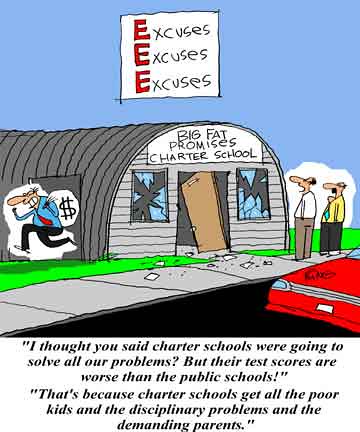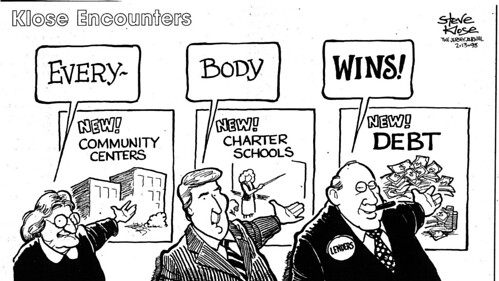Disruptive technologies: Charter schools for public school systems are like the impact of the Internet on newspapers
 (photo source unknown)
(photo source unknown)While not getting into how I think newspapers should have dealt with the Internet (something I did in fact deal with in 1992-1994), it's folly to push public school systems, especially highly functioning ones, towards their destruction. I draw some of this thinking from the ideas of Clayton Christensen on "the innovator's dilemma"/disruptive technologies.
Charter schools are the solution only if we believe that traditional organizations are impossible to improve. Never can be improved. And then creative destruction is the only way. But it is possible to innovate and reform public educational institutions--without destroying unions--not because unions somehow are deserving of unquestioning support, but because they aren't the primary reasons while schools are failing.
Today's Post has an editorial ("Montgomery’s bright new schools chief") and an article ("'Scientist superintendent' heads to MoCo ") about the incoming Superintendent of the Montgomery County Public Schools, Joshua Starr. As editorials often do, it includes a bit of "yes, but," in this case:
We confess to being disappointed by his objections to merit pay for individual teachers and his reservations about the need for charter schools in Montgomery.
The whole argument in favor of charter schools is somewhat misdirected.
1. The real issue is improvement of traditional public schools, which for a variety of reasons over the past few decades, especially in center cities, have been allowed to decline, as various stakeholders (not just teachers unions) have become focused on outcomes other than student achievement.
Charters have come about as an initiative in places where for whatever reason, public schools aren't functioning well, and the prospect of improvement is remote.
2. However, the reality is that charters take social, community, organizational, and financial capital away from the public school system. Only in the theoretical world of market economists do the "competitive opportunities and presence" of charter schools somehow influence the traditional public system to improve.
Instead an alternative system is created, drawing away from the public schools what little energy innovation that remains, while the public schools continue to decline.
3. This doesn't even get into the issue that for the most part, except for what we might call charter school systems such as KIPP, or massive initiatives such as the Harlem Children's Zone, charter schools haven't shown superior performance, as a rule, when compared to traditional public schools.

Source unknown.
4. Some people believe that the charter school movement, which was first more about school privatization and management in different guises, such as the Edison School project and earlier initiatives by Christopher Whittle, is more about privatization and pushing profit-making opportunities to various private sector interests.

Editorial cartoon, Steve Klose, Jersey Journal.
5. The issue of declining public schools is of key importance to revitalization of center cities and first tier suburbs, in terms of neighborhood and community vitality. Neighborhood schools empty out, and dwindling enrollments lead to school closures. Closed neighborhood schools mean that neighborhoods lose one of the only civic assets that typically are present at the neighborhood level, an asset that through children, brings diverse and disparate people together.
6. The ideal of democracy and civic education is lost also as a public school system declines. While each state has basic curriculum requirements which include civic education, it is arguable that "civics" is adequately covered in a balkanized system of "public" education.
7. Even in high performing school systems, charter schools are touted as a way to provide more initiative, innovation, and parental involvement. But I think it's a mistake.
Rather than allow for the kind of cleaving away of financial and community capital, not to mention competition for enrollment, school systems may need to rethink their ability to allow for involvement and engagement of the public and parents.
That goes for school systems in Maryland, even though the Post continues to agitate in favor of charter schools even in thriving education programs such as in Montgomery County.
(On the other hand, there is a lot of "innovation" and "new thinking" on public education--in charter schools and outside of charter schools--that is flawed. Do we really want to enable more flawed approaches, through the relatively weak oversight systems that charter schools tend to work under?)
What the Post doesn't understand is that charter schools are to public school systems as the Internet and information agglomerators are to metropolitan newspapers.
Competition that uses your content for free--in the case of newspapers--is not fair competition.
Similarly, charter schools aren't about providing ways to improve the public education system through competition, they are designed more to bring about a privatization of schooling, and the dissolution of public education.
That isn't something that a newspaper ought to favor, if it is in favor of strong communities.
Labels: change-innovation-transformation, civic engagement, organizational behavior, organizational development, provision of public services, public education/K-12



0 Comments:
Post a Comment
<< Home